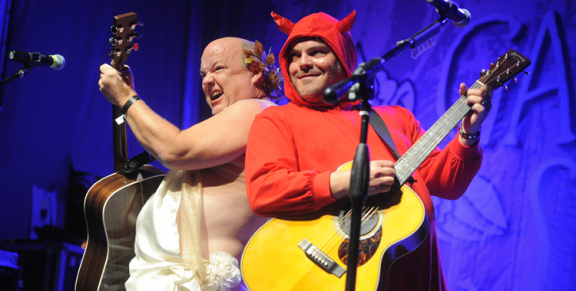Extension Course Advice Needed!
Like many Angelenos who hate their jobs and/or their lives, and who also have been banned from The Learning Annex for reasons better left unmentioned here, I’m thinking of taking a UCLA Extension class or two to help me break into The Biz (show business). Everyone knows that many of the biggest names in show business have begun their careers with UCLA Extension courses. I have perused the Fall schedule and pulled out the most promising courses. I have emboldened the most appealing parts of description. I also investigated the backgrounds of the instructors. I am hoping that you, the losanjealous reader, can help me decide which courses to take.
Acting Action: Combat and Weaponry
X 407.1 Theater 3 units $495
In addition to helping me land martial arts roles, it sounds like these skills will come in handy in your normal everyday asskicking situations. (I always thought it was called “weapontry” with at “T” for some reason. I guess you don’t see that word too much.)
Action is dialogue with movement–the most powerful visual storytelling device. For the beginning actor, the experienced veteran, directors, and editors, this course is structured to prepare the body, inspire the mind, and develop the tools to connect great ideas with superior physical execution. Topics include slaps, punches, deflections and grabs, escapes and reversals, skeletal alignment for greater control and increased visual effect, and “cause-and-effect” timing. Participants work with sabers, staffs, and sticks to create the illusion of power, and cover such topics as co-operative versus combative energy and how to “work the camera” for maximum effect. The instructor demonstrates use of the bullwhip as the ultimate flexible weapon and discusses firearms and gun safety protocols. Elective course in Certificate Program in Film, Television, and Digital Entertainment Media. Enrollment limited.
It is so true that “action is dialogue with movement.” I don’t know why I never thought of that before.
I think I will focus on just punches because slaps is more like for women. I don’t mean as in to slap women, but as in women slapping others. I think the reversals would be cool too because then when someone comes up from behind you and wraps you up, you could do that thing where you get out of it real fast and you end up spinning them and twisting their arm behind their back and I’d be all like “WHAT’S UP NOW, BITCH?!” and push their arm up just until it was about to break.
Note: find out if staffs includes bowstaffs. (Like the Sith had.)
But I must disagree about the bullwhip being the “ultimate flexible weapon.” A bullwhip is essentially useless if you are grappling mano-a-mano. I bought a bullwhip in Tijuana when I was 12 and I quickly found out that if your opponent ran at you, you were pretty much fucked. I would have to say a good old fashioned mace is the ultimate flexible weapon. Or maybe nunchucks.
No Textbook Required
Sweet. You can’t learn this stuff by reading about it anyhow.
Anthony De Longis, actor, fight director/choreographer, and action coordinator who was the swordmaster on the feature film Secondhand Lions and the television series The Queen of Swords. Mr. De Longis has guest-starred in feature films and television shows, including the Jet Li film Fearless (working title), Roadhouse, Star Trek: Voyager, ER, Alias, Highlander: The Series, and Sword and the Sorcerer, and trained Michelle Pfeiffer as Catwoman in Batman Returns.
Highlander rules and Anthony De Longis is a pretty good swordmaster but he’s no Dan Speaker, probably the best swordmaster out there. He was swordmaster on Army of Darkness. But this could just be my own personal taste in swordmasters.
Another class I am considering is:
Music for Games
X 478.51 Music 4 units $515
I am always going “doot doot doot doot-doot doo doo doo doot-doo doot-doo-doo” (Super Mario Bros–duh) and people are saying to me “You should make some of those game songs of your own.” A long time ago I had this one that went “Da da da-dee-dee-doo (Bah duh duh) Da da da-dee-dee-doo (Bah duh duh DUH)” that would have been great for a Castlevania/Contra-type game. I plugged my Casio into my radio and made a tape of it. I could have used this class back then! I wonder if I can find that tape.
The fast-growing game industry provides limitless opportunities for musicians, composers, music supervisors, and producers. In this course, participants learn how music for games is created and how to break into this exciting and lucrative industry. Topics include a history of game audio; structure of the game industry; tools used in producing game music; distinction between composing for games and films; relationship between music, gameplay, and story; the immersive qualities of game audio; looping versus adaptive music; non-linear composing; player-composer collaborations; game audio career choices and strategies; demo creation; networking; contractual issues; game music organizations; and the future of the game industry. Guest speakers (subject to availability) include Alexander Brandon, Audio Director, Midway; David Javelosa, composer/music technologist, Jurassic Park; Christian Johnson, Audio Director, Vivendi Universal Games; Aaron Marks, composer and author, On Your Mark Music; Lennie Moore, composer, Outcast; Mical Pedriana, Audio Director, Electronic Arts; Rich Ragsdale, composer, Alien vs. Predator; and Chance Thomas, composer, Unreal II: The Awakening. Elective course in Certificate Programs in The Music Business, Songwriting, and Film Scoring.
Well I did like Rich Ragsdale’s score for “Eight Legged Freaks,” but then again who didn’t.
Jeannie Novak, founder/CEO, Indiespace, an Internet entertainment marketing and technology company for independent game developers, filmmakers, musicians, writers, and artists. Ms. Novak has created game development curricula for various universities, and is lead author and series editor of Game Development Essentials, a series of books covering all aspects of the game industry, including project management, story and character development, interface design, level design, gameplay, history, audio, marketing, online multiplayer games, and mobile games. She also is an independent recording artist, music supervisor, and composer.
I wish my school had a game development curriculum. But this is sweet, because I already had Jeannie’s CD, Reign of Fire, “16 Cinematic Classical Compositions for Solo Piano.”
Finally, since I was already making a show for HBO, this one sounded pretty good:
How to Create, Develop, Pitch, and Sell New Network and Cable TV Series: A Producer’s Perspective
X 476.362 Film & Television 2 units $395The television landscape is always changing. Agents, studios, and network executives change places everyday, making it increasingly difficult for aspiring television writers/producers to sell their ideas. How do you create the next big hit series? How do you develop a basic idea into an appealing form that gets a network’s attention? Each week, participants explore ways to generate ideas that are fresh, new, and different; create and flesh out unique and distinct characters; determine the tone and style of the series; find representation; and, ultimately, master the essentials of how to write up the pitch presentation. Students have the opportunity to develop their idea, pitch it to the class, and receive feedback from the instructor and guest speakers. Discussions and projects are supplemented by prominent industry guests each week, including top television executive producers and creators for scripted and unscripted television series and TV movies. Guests from such major Hollywood agencies as CAA, UTA, and the Gersh Agency also are featured. Elective course in Certificate Program in Film, Television, and Digital Entertainment media.
So my show is a one-hour drama like The Sopranos, but different. I don’t want to give too much away, but it is set in the high-stakes world of high-end audio-video retailing. There is so much material there–plasmas, TiVos, Bose speakers, etc. One word: Home installations. The show writes itself. But this class could give me the edge. How sweet would it be to be able to write this letter:
Dear HBO (Home Box Office),
I have recently graduated from UCLA EXTENSION with a certificate in Cable TV Series Making. (PDF attached.) I finished at the top of our class with a complete/pass and you could tell the teacher really liked me. I would like to work for HBO and make one hour drama series. My idea is called…[HERE IS WHERE I FILL IN THE DESCRIPTION]
CC: Showtime
No Textbook Required
Duh, this is TV!
Douglas Schwartz, television producer who was the co-creator and executive producer of Baywatch. Mr. Schwartz was the primary show runner of over 300 episodes and directed and wrote almost 100 episodes of the series. He also created over eight television scripted series and over 20 television movies. Mr. Schwartz currently is under contract to Fox Television Studios where he is developing network one-hour scripted programming, reality programming, and TV movies.
OMG! Doug Schwartz is teaching this class! Sherwood Schwartz’s nephew!
So as you can see, there is a lot to choose from! I welcome any advice. Of course I would love to take them all but I only have $1,000 to spend, and it’s either this or health insurance.



















